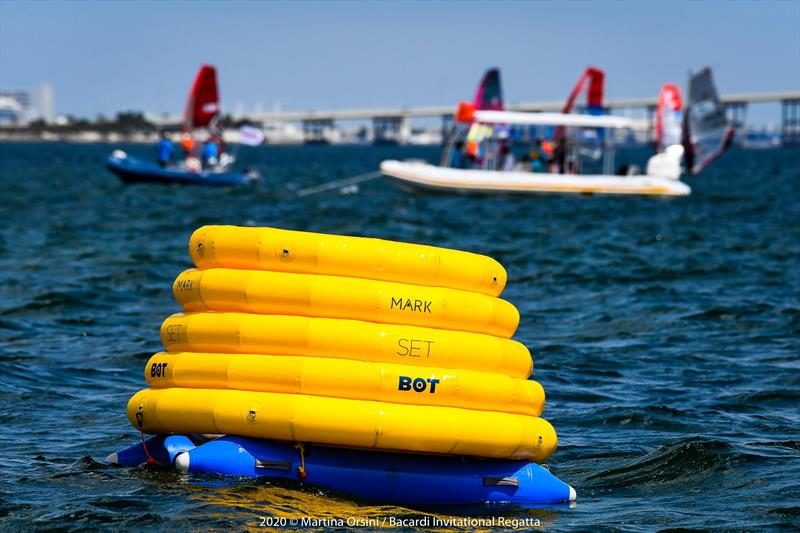
MarkSetBot to launch new technology
by Jan Harley 6 Nov 2020 15:41 GMT

MarkSetBots at the Bacardi Cup © MarkSetBot
Fully automated regatta demonstrates race management capabilities
MarkSetBot, the company which debuted anchorless marks that move with a swipe of the finger, is set to launch its latest innovation, RaceOS. This powerful new tool will simplify race management through complete course automation, bringing elite-level race technology to the local racecourse and likely spelling the end of the dreaded general recall. Company founder Kevin Morin will host a live Launch Event with Q & A on Saturday, November 7, 2020, at noon EST to provide details on how the technology works, including video demo. To register, please visit: www.marksetbot.com/raceos/#contact
"RaceOS is an example of industry leaders working together to solve the unsolvable," said Kevin Morin, founder of RaceOS and MarkSetBot. "In this case, MarkSetBot collaborated with TracTrac, SAP Sailing Analytics, Calypso Instruments, SailBot and Yacht Scoring to integrate all of these technologies and create full racecourse automation. It's incredible to see large and small companies come together to execute on a game-changing innovation like this."
Background on RaceOS
In late October, MarkSetBot held the first-ever fully automated regatta at Crescent Sail Yacht Club in Detroit, Michigan. With one click in the MarkSetBot app, three MarkSetBots deployed from the club; wind data collected by one of the Bots was used to set the windward-leeward course and, with the course set, the Bots notified sailors of the starting sequence. Each boat was outfitted with a tracker to detect OCS. Racers were alerted to starts, course changes and recalls via Bot-triggered horns and smartphone, smartwatch and VHF notifications. Once all boats were cleared, the starting line Bots adjusted to become leeward gates and ultimately the finish line. Throughout the race the Bots collected wind data and adjustments were made to keep the course perfectly square. The Bots stationed at the finish sounded a horn for the first competitor across the line and recorded all finish times. No race management volunteers, motorboats, anchors, or fuel were needed to run this regatta resulting in zero impact on the environment.
Competitors were enthusiastic about their experience in the first fully autonomous regatta with many remarking on how impressive the system worked. They offered resounding compliments on the flawless course changes all controlled by a wind sensor on the weather mark.
"We were over early in a race," said Mark Allen of Pontiac Yacht Club. "I was able to look at my watch for a notification and we cleared ourselves immediately. We were able to be aggressive at the start knowing we'd receive quick notification with none of the confusion that normally comes from getting hailed for being OCS."
Jim Thompson, of Crescent Sail Yacht Club, was also OCS. "The last time I was called OCS in a regular race it took over a minute to get the notice as we were the last boat called in a group of five that were over. With RaceOS, we got the notification on our phone in just seconds."
The regatta at Crescent Sail Yacht Club, while fully automated, is one example of how the technology can be used. Regatta organizers can choose the level of automation desired. When volunteers are in short supply, as often happens during a busy sailing season, an event organizer would use Full Course Automation. In a championship regatta setting, Mark and Sensor Automation puts the Bots under the control of the PRO who can instruct the Bots to sound horn sequences, signal course changes, provide constant wind readings and historical data, all while leaving decision-making and competitor tracking under human control.
"This is incredible technology," said Russell Coutts, CEO of SailGP. "It will go a long way towards making our sport environmentally friendly by using less race officials and race committee vessels. It should also eliminate unnecessary general recalls, disqualifications, and speed up race operations. It will result in fairer, more accurate racing for all competitors at less expense and will be a total game changer for sailing."